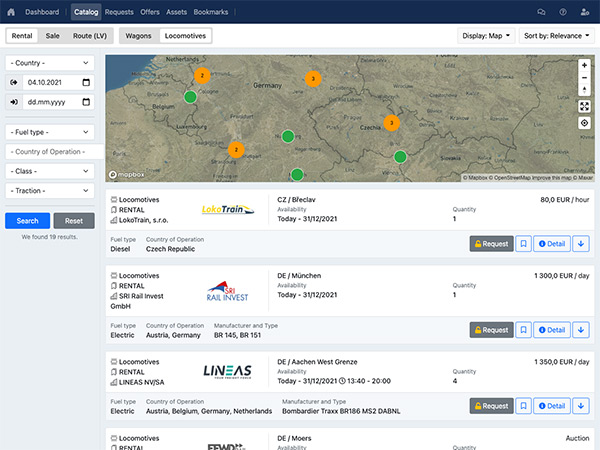Where do you see the most significant gap from a legal perspective that railway companies are neglecting?
In the context of railway operations, I believe a significant gap exists in the organization and tracking of contracts and workflows. Railway companies can more effectively attribute any problem situations to the responsible parties by streamlining these processes. This approach is not just about administrative efficiency; it's fundamentally about enhancing claims handling. A transparent and accountable system makes it easier to identify and address issues promptly and justly, which is crucial in a sector as complex as the railway industry.
In what cases and which companies turn to you for help in legal issues?
We have a team of lawyers with deep expertise in the industry, and many of us are actually passionate about this sector. We cover various legal needs, including contractual support, procurement of vehicles and personnel, handling accidents, facilitating market access and addressing competition issues, and managing court proceedings. Our expertise extends to corporate and merger issues and labour law; we provide everyday legal assistance. We attract a variety of clients who value this comprehensive and specialized skill set, seeking our help in navigating the complex legal landscape of the rail industry.
Railways are getting more international every day. How complex have the legal issues become over the past few years, and what areas cause the most considerable difficulties for companies from your point of view?
The international nature of the railway industry is mirrored in our legal work, which has always had a global scope. As international lawyers, we do not promote the law in one country or another. This is especially pertinent in Europe, where the industry is primarily governed by EU law and the COTIF conventions. One of the most significant challenges we face is the language. Avoiding misunderstandings and knowing the law are our primary jobs.
The legal proceedings are often preventable by risk mitigations. What measures in risk mitigation in railway transport do you recommend to your clients?
To proactively prevent legal proceedings, I recommend to our clients the importance of clear and understandable communication across all forms of documentation – not just contracts but also offers, emails, and other correspondences. When problems or disputes arise, engaging in open communication with and without lawyers and sometimes in varied group constellations to foster understanding and find solutions is crucial. In cases where resolution processes are extended, we advise considering the waiver of the statute of limitations to facilitate ongoing dialogue. It's a well-known fact in our industry that we often encounter the same stakeholders repeatedly, so maintaining good relationships is key.
Can you mention some unique situations you had to solve in the railway business during your career?
Throughout my career, I've encountered various unique and challenging situations in the railway industry. To name a few, we've had cases of mysteriously disappeared wagons, which required creative problem-solving. Then, there was the unusual occurrence of snow found inside closed wagons, a perplexing situation that needed addressing. I've also been involved in disputes regarding infrastructure charges and tackling issues related to overpriced traction power. Additionally, dealing with various animals causing disruptions on overhead lines and tracks has been part of the unexpected challenges in this field. This variety of challenges, which are sometimes quirky, is something I absolutely love about my job; it makes every day exciting.
You are active in Germany and Poland. What are the most prominent intersections and differences between these two markets from your legal perspective in the railway industry?
Germany and Poland depend on their rail systems due to their geographical size. Both countries share a typical enthusiasm for the railroads and a desire to expand passenger and freight transport by rail. From a legal point of view, the differences are not very significant. One notable difference, however, is the degree of privatization. In my observation, the privatization process in Germany is somewhat more advanced than Poland's. This is reflected in how railroad companies in both countries organize their operations and legal framework.
This year, you are celebrating 20 years in the company, congratulations! Please tell us your story - how your relationship with the railway industry began?
Thank you for the congratulations! My journey in the railway industry began 23 years ago. Initially, I spent two years working in Poland. Upon joining TIGGES, I became part of the Polish Desk, supporting the first private Polish railway undertaking as it ambitiously expanded westward. There was a growing need for someone to handle railway-related matters within the firm. I seized this opportunity, which initiated my continued interest and involvement in the rail sector. That early involvement was the spark for my 20-year journey with the firm in the railroad industry.
How do you see the evolution of the railway industry in the last 20 years from a legal perspective?
Over the last two decades, the rail sector has changed significantly, particularly in legal terms. Increasing competition has led to a significant professionalization of all parties involved, including legal bodies such as authorities, courts and lawyers. This change has opened up numerous new areas of law and reduced the once-dominant influence of the state railroads. However, this change is an ongoing process. The European rail sector increasingly attracts investors who see it as an attractive market. In addition, the trend towards sustainability is gaining momentum, and it will be interesting to see its impact on the legal landscape of our industry in the coming years.

